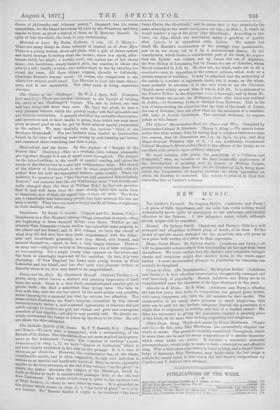The Catholic Epistle of Si. James. By F. T. Bassett,
M.A. (Bagster and Sons.)—We have hero a translation, with a commeLtary, of the Epistle of St. James. The translation does not seem much of an improve- Ment on the Authorised Version. For "shadow of turning" (TporrFir clasiesfrealha) in chap. 1, 17, we have "shadow of declension," which is not very clearly explained in the note on the passage. It is a case of obscurran per obscurius. However, the commentary has, on the whole, considerable merits, and is often suggestive, though now and then it strikes us as fanciful and needlessly mystical. This, we think, especially applies to tho long excursus, at the end of tho volume, " on the glory," in which the author discusses the subject of the Shechinah, which ho finds or thinks he finds in innumerable passages both of the Old and New Testament The whole of this essay is quite in the mystical tone of Philo Judesas, to whom ho once refers by name. It is grounded on the phrase wlaieh occurs in chap. ii., 1, "tho Lord of glory," as it is in our version. Mr. Bassett thinks it ought to be rendered " tho Lord
Jesus Christ, the Shochinah," and he notes that it has essentially the same meaning as the words 44MoyartAx 74je lne, in Hob. i., 3, which he would render a ray of the glory' (the Shechinah). According to this view, 44:l Nos, which our translators make a genitive of quality after Xpirrov, is in apposition with XpiaTau. We cannot but think Mr. Bassett's construction of the passage very questionable, and he is, we fancy, led to it by a preconceived theory. In his introduction, which forms a considerable part of his book, he argues that the Epistle was written, not by James the son of Alphams, the first Bishop of Jerusalem, but by James the son of Zebedee, whom Herod beheaded in A.D. 44. He does not, we think, make out at all a conclusive case, in opposition to the general opinion, which rests on a certain amount of tradition. It may be admitted that the authorship of the epistle is a matter of legitimate doubt, but it seems, on the whole, moro probable to attribute it to one who lived to see the Christian Church more widely spread than it was in A.D. 44. It is addressed to the Twelve Tribes in the dispersion (Tois l baer9r4,4), and by these Mr. Bassett thinks are meant the Hellenists, those who were non-resident in Judtea,—to Grecising Jews, as distinct from Hebrews. This is his way of surmounting the objection that the date of the death of James, the son of Zebedee, does not allow time for the existence of a consider- able body of Jewish Christians. The internal evidence, he argues, points to this James.


































 Previous page
Previous page